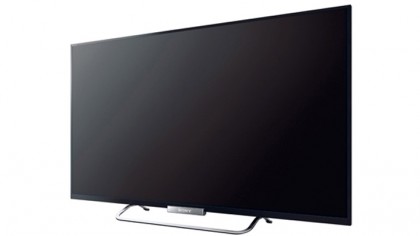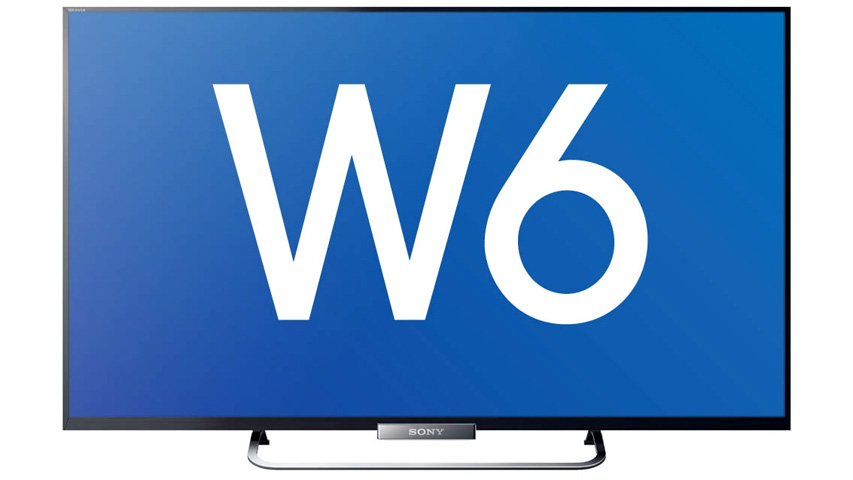Why you can trust TechRadar
At first glance the 42W653A looks pretty handy from a design perspective. Its silver stand is remarkably trim for something holding up a 42-inch TV, and the shiny silver box hanging from the TV's bottom edge containing the TV's processing chips is distinctive and cute.
However, its black bezel is neither as sleek nor as well built as those wrapped around Sony's posher 2013 TVs. Nor is there any sign of the 'Sense of Quartz' reflective bluish stripe feature that helps Sony's W805A and W905A models stand out from the crowd.
Still, while the 42W653A might not find itself taking pride of place in any classic design museums anytime soon, it still looks a bit better overall than your average budget TV.
Ins and outs
The 42W653A's relatively budget nature becomes more apparent when you spin the TV round and check out its rear, though. We were rather startled to find only two HDMIs when the vast majority of modern TVs carry twice that number. And there's only one USB port where most TVs offer at least two.
Neither of these issues needs to be a deal breaker, of course. Many of the 42W653A's target audience likely won't need any more HDMIs and USBs than the 42W653A offers. And even if they do, you can add external switchboxes – at least where the HDMIs are concerned. However, only having so few HDMIs and USBs does raise concerns about the extent of the set's AV and multimedia ambitions.
These concerns are hardly assuaged by the fact that the HDMIs aren't built to the 3D spec. Which means, of course, that the TV isn't capable of playing 3D. But aside from maybe reinforcing the sense of the TV lacking ambition, it's becoming ever more apparent that 3D is of minimal-to-no importance to your average household.
There's also a bit of good news where the 42W653A's multimedia talents are concerned. For as well as supporting playback of a handily expansive set of video, photo and music file formats via its solitary USB, it can also play the same sort of files from networked computers via a LAN port or built-in Wi-Fi system.
Sign up for breaking news, reviews, opinion, top tech deals, and more.
Sony Entertainment Network
These network options also allow you to delve into the joys of the Sony Entertainment Network – Sony's ring-fenced online content system. This system is far from perfect. For starters, its interface is rather basic compared with the slick and well-structured smart TV menus found on some rival TVs this year, making it harder to track down content quickly. It's also not got nearly as many apps to its name as the latest services from Samsung and LG - and among the content sources it lacks are the 4OD and ITV Player catch-up TV portals currently exclusively supported by Samsung's online TV platform.

However, we'd take quality over quantity any day when it comes to online TV apps, where quality more often than not refers to video streaming services. And in this respect, despite the lack of ITV Player and 4OD support, the 42W653A does pretty well. The likes of Netflix, Lovefilm, Sony's own Video Unlimited and World of TV services join the BBC News, Sky News and the BBC Player and Demand 5 catch-up TV services.
There's a lot of pretty obscure video content too, but this is still more welcome than the reams of obscure non-video apps many rival online TV platforms clutter themselves up with.
Picture management
When it comes to setting up the 42W653A's pictures, Sony's tendency to forge its own furrow with its set-up tools is in evidence. But once you get your head round the rather non-standard approach to things, the reality is that the 42W653A gives you a strong amount of flexibility over how its final pictures look, including a degree of colour, white balance and gamma management.
You're also given control over many elements of Sony's X-Reality Pro video processing engine including, most usefully, a pair of noise reduction systems, and Sony's various motion processing options. Just bear in mind that these options all need to be used with extreme care. Choosing the wrong setting (which basically means any of the most powerful settings on offer) can result in pictures looking processed and glitchy rather than cleaner and more immersive.
The last thing to touch on is the spec of 42W653A's panel. Its 200Hz emulation (it's a 100Hz panel with backlight blinking) should help motion clarity, and while its edge LED lighting system isn't backed up by local dimming, this doesn't automatically preclude it from producing a strong contrast performance. Especially as it doesn't use one of the notoriously low-contrast passive 3D panels used in the 47W805A.

John has been writing about home entertainment technology for more than two decades - an especially impressive feat considering he still claims to only be 35 years old (yeah, right). In that time he’s reviewed hundreds if not thousands of TVs, projectors and speakers, and spent frankly far too long sitting by himself in a dark room.
